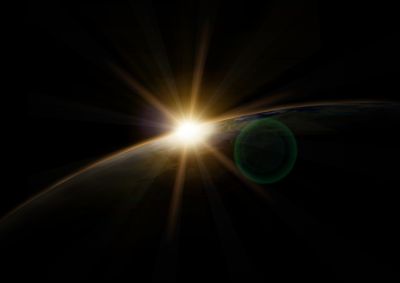When you arise from the abyssal depths of self-chosen slavery, when you step out from the obscuring shadow of superstition, you begin to see the world as it truly is. And with the clear sight that atheism grants, the next step follows naturally. Once we know what beliefs are false, we have to begin the much harder task of discovering what’s true. I’d like to offer a signpost in that quest.
As human beings, we find ourselves in a world not of our own making. But although we didn’t choose it, we know that we belong here, that we’re part of this world. Science confirms that, as it shows us that we are coalesced stardust, made of the same stuff as the rest of the universe; that we, like everything else, are patterns of atoms endlessly recycled through the ebb and flow of natural processes.
But for all that, the world isn’t always kind to us. We’ve accomplished great things, built magnificent works of architecture and technology, but we’re still dependent on natural forces that are far more powerful than us and that we can’t command. Even the richest, most advanced societies in the world are by no means exempt, as we’ve been repeatedly reminded. Last year, Hurricane Sandy swamped the East Coast, stunning the world with images of flooded Manhattan streets. This year, a prolonged Midwest drought is threatening to make the Mississippi River impassable as water levels drop to all-time lows.
Whenever there’s a disaster like these, there are always religious apologists jostling for attention, trying to blame it on some alleged sin committed by the people affected. They never seem to ask why it is that people who live on fault lines are always punished by earthquakes, people who live on the coasts are punished by floods and hurricanes, and people who live on plains are punished by tornadoes and wildfires. If preachers could regularly predict natural disasters in a way that meteorologists couldn’t, they might be worth taking seriously. As it is, they’re clearly inventing post hoc explanations for random events.
The truth is that there’s no recognition of good or evil woven into the fabric of the universe. To believe otherwise raises impossible problems. We can stand awestruck before the sunshot spaces in the high branches of trees, the vista of continental cliffs overlooking the ocean, or the diamond whirl of a spiral galaxy; but how should we respond to the sadistic subtlety of a parasitic hookworm, the machined precision of an Ebola virus, the mindless inexorability of a cancer that consumes its host and in so doing kills itself? What should we think of a cuckoo chick that invades a nest, pushes the other eggs out to smash on the ground, and deceives the parents into feeding and sheltering the killer of their children? If we admire the jewel-like glistening of a dewy spiderweb, shouldn’t we also think of the horrific death it represents for the luckless insect that flies into it?
But if we stop looking for reasons, if we cease the futile project of theodicy, we arrive at a simpler and more comforting view: the cosmos doesn’t reward or punish, it simply is. There’s no greater power, no intelligence behind the world; this is it, it’s all real, it’s all here. Nature is full of vast, luminous, breath-catching beauty, but also death, savagery, appalling destruction and hideous cruelty. It dispassionately spins out joy and agony in equal measure, and notices neither the happiness it creates nor the havoc it wreaks.
And if there’s no supernatural operator in back of nature, then that means just one thing: it’s all up to us. The empty heavens don’t care if we cry out to them, but we care about each other. We can’t fully control nature, nor can we escape our dependence on it. But if we devote ourselves to scientific progress, we can improve our situation by eradicating those evils we can and building resilience into our society to withstand the rest. In an indifferent and often hostile universe, this is more than enough work to occupy our full attention as a species – which makes it all the more tragic that we so often waste resources fighting each other in zero-sum competition, letting natural evils go unremedied. Had we put those same resources into cooperation, we could instead have produced something that would have benefited everyone.
Now we’ve reached that signpost, so let’s take a look back. We began with the fact of our vulnerability in a chaotic universe, and wound up with an ethic of reason, compassion and cooperation, what’s usually called humanism. This is just how secular ethics should work: moral principles flow from a correct understanding of the facts. We must care for each other, because nature doesn’t care about us, and no one else will do it if we don’t. There’s no greater power transcending nature, but we can become that greater power. We can be a force for morality in an amoral cosmos – but it will only happen if we work to develop our moral wisdom alongside our technological prowess.
Image credit: Shutterstock
